

In order to prevent and manage social isolation, this is a guide for individuals and caregivers to understand more about social isolation and how it can affect the elderly population. Social Isolation and Well-Being for Caregivers during COVID-19. Social Isolation Statistics. Social isolation. Seniors felt less socially satisfied, more isolated during Covid-19 circuit breaker period: Survey, Singapore News. SINGAPORE - Social isolation during the circuit breaker period resulted in lower social satisfaction levels for senior citizens, according to results from a monthly survey of about 7,500 people aged between 55 and 75 here. Social satisfaction levels dipped by about 4 per cent in May when compared with data from January. In particular, for senior citizens living with others, satisfaction levels fell to the pre-circuit breaker levels of peers living alone, while those living alone saw even lower satisfaction levels as safe distancing measures made it more difficult to find support from friends and the community.
As of July, while satisfaction levels have rebounded after the circuit breaker period, which was from April 7 to June 1, they are not back to the levels they were at before. As Singapore's population ages, the proportion of those who remain single and live alone will increase, said Prof Straughan, a sociologist and former Nominated Member of Parliament. Coronavirus: Elderly hit hard by social isolation amid circuit breaker measures, Health News. A needle and the television set - these two objects have been keeping 83-year-old Nellie Woo company from morning to night for the past week while she is holed up alone at home. She used to enjoy playing bingo and exercising with her elderly neighbours at the Senior Activity Centre (SAC) downstairs, as well as chatting with volunteers who visited her studio flat. Now that all activities for seniors - including home visits - have ceased due to strict circuit breaker measures, Madam Woo is feeling lonely and emotionally down.
She thinks about suicide sometimes, and has spent so much time staring at her patchwork and TV lately that her doctor had to give her antibiotics for dry eyes. For such elderly people, the ills that come with social isolation pose a significant health risk, say some seniors and social workers. Out of the 208,000 people who live alone in Singapore, at least a quarter of them are elderly. Older adults felt socially isolated, less satisfied during COVID-19 circuit breaker: Survey. Social Isolation in Seniors. How Social Isolation Affects the Brain. Daisy Fancourt was at her home in Surrey in southeast England when the UK government formally announced a nationwide lockdown.
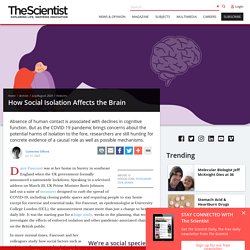
Speaking in a televised address on March 23, UK Prime Minister Boris Johnson laid out a suite of measures designed to curb the spread of COVID-19, including closing public spaces and requiring people to stay home except for exercise and essential tasks. For Fancourt, an epidemiologist at University College London (UCL), the announcement meant more than just a change to her daily life. It was the starting gun for a huge study, weeks in the planning, that would investigate the effects of enforced isolation and other pandemic-associated changes on the British public. We’re a social species. We really need others to survive. In more normal times, Fancourt and her colleagues study how social factors such as isolation influence mental and physical health.
. © istock.com, Maria Zamchy. Social Interaction Is Critical for Mental and Physical Health. In another study, published in The New England Journal of Medicine in 1984, researchers at the Health Insurance Plan of Greater New York found that among 2,320 men who had survived a heart attack, those with strong connections with other people had only a quarter the risk of death within the following three years as those who lacked social connectedness.
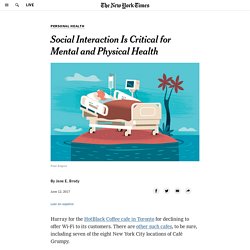
Researchers at Duke University Medical Center also found that social ties can reduce deaths among people with serious medical conditions. Beverly H. Brummett and colleagues reported in 2001 that among adults with coronary artery disease, the mortality rate was 2.4 times higher among those who were socially isolated. Social isolation puts elderly at health risk. ANN ARBOR—One in five elderly adults is socially isolated from family or friends, increasing their risks for poor mental and physical health, as well as higher rates of mortality, according to a University of Michigan study.
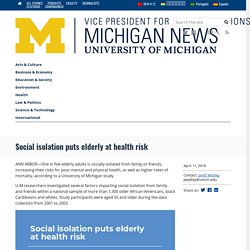
U-M researchers investigated several factors impacting social isolation from family and friends within a national sample of more than 1,300 older African-Americans, black Caribbeans and whites. Study participants were aged 55 and older during the data collection from 2001 to 2003. Overall, most elderly were connected to both family and friends (77 percent), while 11 percent were isolated from friends only and 7 percent were isolated from family members only. Of concern, however, were the 5 percent of elderly who were socially isolated from both family and friends, which may place them at risk for physical and mental health problems, the researchers say. Men were more likely than women to be socially isolated. The findings appear in the journal Healthcare. The loneliness of social isolation can affect your brain and raise dementia risk in older adults.
Physical pain is unpleasant, yet it’s vital for survival because it’s a warning that your body is in danger.
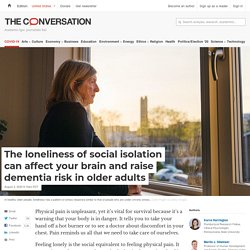
It tells you to take your hand off a hot burner or to see a doctor about discomfort in your chest. Pain reminds us all that we need to take care of ourselves. Feeling lonely is the social equivalent to feeling physical pain. It even triggers the same pathways in the brain that are involved in processing emotional responses to physical pain. Just like feeling physical pain, feeling lonely and disconnected from others is also a signal that we need to take care of ourselves by seeking the safety and comfort of companionship.
As scholars at the Center for Healthy Aging at Penn State, we study the impact of stress on the aging body and brain, including how it can worsen cognitive decline and risk for dementia. 14 Ways to Help Seniors Avoid Social Isolation - A vast body of evidence demonstrates the physical benefits of a healthy social life.
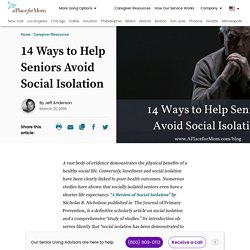
Conversely, loneliness and social isolation have been clearly linked to poor health outcomes. Numerous studies have shown that socially isolated seniors even have a shorter life expectancy. How to Prevent Social Isolation from Making Loneliness Worse - COVID-19 - Johns Hopkins Bloomberg School of Public Health. By Brian W.
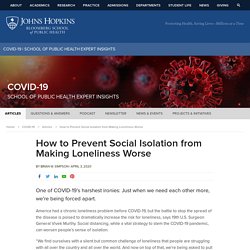
Simpson | April 3, 2020 One of COVID-19’s harshest ironies: Just when we need each other more, we’re being forced apart. America had a chronic loneliness problem before COVID-19, but the battle to stop the spread of the disease is poised to dramatically increase the risk for loneliness, says 19th U.S. Surgeon General Vivek Murthy. Social distancing, while a vital strategy to stem the COVID-19 pandemic, can worsen people’s sense of isolation. “We find ourselves with a silent but common challenge of loneliness that people are struggling with all over the country and all over the world. Murthy knows loneliness. More than 20% of Americans reported that they often or always feel lonely in a 2018 Kaiser Family Foundation study.